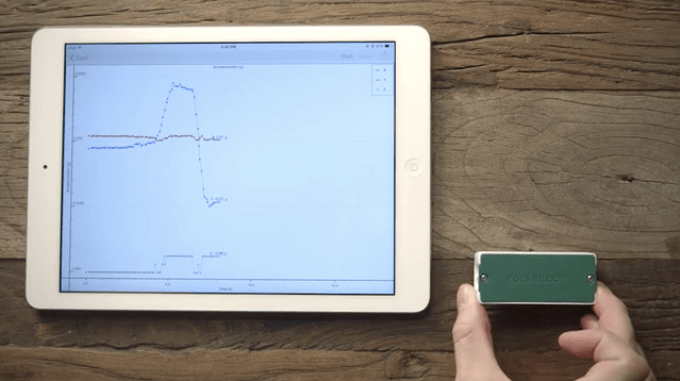Here’s a neat crowdfunding project that’s aiming to repackage wireless sensor technology as a multi-faceted educational tool that plugs into existing mobile devices and services to encourage kids to engage with science experiments — and even devise and conduct their own experiments. Just add curiosity.
Called PocketLab, it’s a ruggedized wireless sensor that streams real-time data — it’s capable of measuring acceleration, force, angular velocity, magnetic field, pressure, altitude, and temperature — to an Android or iOS smartphone or tablet (via Bluetooth 4.0). From there it’s uploaded to PocketLab’s cloud platform where it can be stored, visualized and analyzed (such as via real-time graphs), and integrated with other software (such as Excel and Google Docs).
The team reckons their roughly $100 sensor (up for pre-order via Kickstarter) can replace dedicated educational hardware sensors and probes, made by the likes of Vernier, PASCO, and Texas Instruments, given it has multifunctional sensing abilities that can support a range of experiments.
It also offers an intentionally simplified user-experience that puts the data front and centre, allowing kids to focus on looking at real-time measurements on an iPad (or other mobile device), rather than having to figure out how to use dedicated sensing hardware. Just strap PocketLab to a moving object (or person/creature) and watch the data flow in.
PocketLab is the brainchild of Clifton Roozeboom, a PhD student based in Mountain View. “My PhD is in developing new sensor technology and I realized that there were huge barriers for people to easily gather data about the physical world. When I looked at the equipment available for science education, most of it was decades old technology and prohibitively expensive,” he tells TechCrunch.
As well as building hardware and a cloud platform to visualize the real-time data streaming in from PocketLab, the team has created initial lesson content to showcase how the device can be used to experiment with various physical forces. However it’s not their aim to become an educational content company per se. Rather, says Roozeboom, they want to provide a starting point and then hand that over to a community of educators to plug its capabilities into curriculum requirements.
“We want to build high quality science content to get users started, but our goal is to be more like Little Bits, Arduino, and Raspberry Pi, where we enable open-ended exploration. Our core competencies are in the hardware, app, and cloud software development,” he adds.
“We have done a lot of user testing in the AP physics classes at Leigh High School and have used PocketLab with two physics classes and two mechanical engineering classes at Stanford. We have tested beta hardware with 12 science teachers across the country.”
Roozeboom says the data PocketLab pulls come from smartphone “industry standard sensors” — which he claims means it can offer better performance than many of the existing sensing products it’s looking to replace, owing to this type of sensing tech being more state of the art.
Why hasn’t this been done before? Roozeboom reckons that’s down to education being “an often ignored industry by Silicon Valley”. “It deserves the same level of innovation that entrepreneurs apply to consumer electronics,” he adds.
Initial funding for the project came from prize money from two business plan competitions: Yale School of Management Education Leadership Conference and Stanford BASES, says Roozeboom. The team has also recently raised a small angel round of funding to cover some of their engineering costs.
On Kickstarter they are looking to raise $25,000 but have already surpassed that goal, with almost $30,000 now pledged and another 29 days left of their campaign to run. The plan is to ship PocketLab to backers in June.
